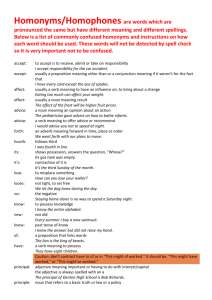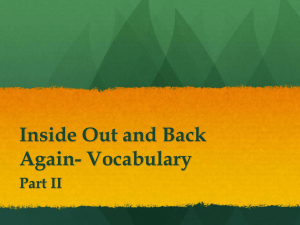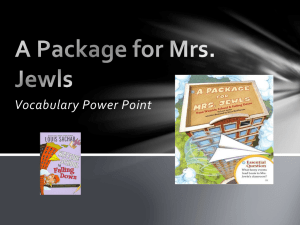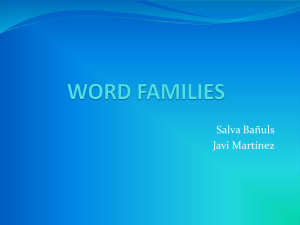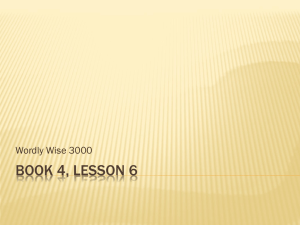Devilish Duos Page 1 a, an Use n before nouns or other words that
advertisement
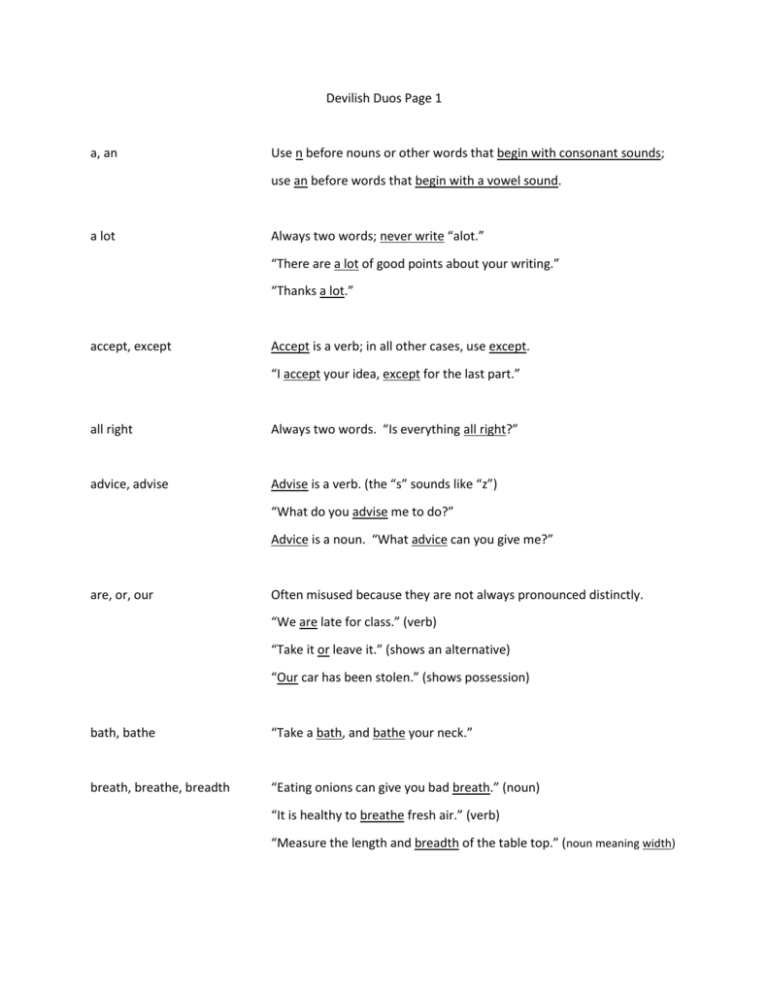
Devilish Duos Page 1 a, an Use n before nouns or other words that begin with consonant sounds; use an before words that begin with a vowel sound. a lot Always two words; never write “alot.” “There are a lot of good points about your writing.” “Thanks a lot.” accept, except Accept is a verb; in all other cases, use except. “I accept your idea, except for the last part.” all right Always two words. “Is everything all right?” advice, advise Advise is a verb. (the “s” sounds like “z”) “What do you advise me to do?” Advice is a noun. “What advice can you give me?” are, or, our Often misused because they are not always pronounced distinctly. “We are late for class.” (verb) “Take it or leave it.” (shows an alternative) “Our car has been stolen.” (shows possession) bath, bathe “Take a bath, and bathe your neck.” breath, breathe, breadth “Eating onions can give you bad breath.” (noun) “It is healthy to breathe fresh air.” (verb) “Measure the length and breadth of the table top.” (noun meaning width) Devilish Duos Page 2 cite, sight, site “Cite a passage in the Bible.” (verb to say or refer to) “That is a gorgeous sight.” (a noun, the object of vision) “This is the site for the new building.” (noun, refers to place) Use the word scene as a reference for site. choose, chose “I choose to stay home today.” (present) “Yesterday I chose a new pair of shoes.” (past) cloth, clothe, cloths Cloth is the material you make clothes out of in order to clothe yourself. Cloths is illiterate for clothes when the idea of garments is conveyed. coarse, course “It is a coarse fiber.” Coarse refers to texture. “Language is coarse and offensive.” Otherwise, use course. “Of course you will pass this course.” conscience, conscious “I have a guilty conscience.” (noun meaning a sense of right and wrong) “I am conscious of the problem.” (adjective meaning aware, awake) fourth, forty, forth Fourth obviously refers to the number four; so does forty. “The forty-fourth player is ineligible.” Forth refers to direction of movement. “The chair rocks back and forth.” have, of “Have” is a verb ; spoken quickly or used in a contraction. It may sound like “of.” “I could have gone to the movies.” “I could’ve gone to the movies.” Never use: “I could of gone.” Devilish Duos Page 3 idea, ideal An idea is a thought of conception. An ideal (noun) is a model of perfection or a goal. Ideal should not be used in place of idea. The idea (not ideal) of the play is that our ideals often sustain us. it’s, its It’s is a contraction for “it is.” Its merely shows possession. While nouns use an apostrophe to show possession (boy’s), we do not use the apostrophe for personal possessive pronouns: hers, his, its or for the possessive case of who (whose). (Since it makes no sense to write her’s, or his’s, it makes no sense to write it’s.) lead, led The verb “to lead” sounds like “leed.” “I now lead the platoon.” (present) “He led the platoon.” (past) Lead is a mineral. “I have a lead pencil. loose, lose “I have a loose tooth.” (adjective) “He will lose the fight.” (verb) “He suffered a loss.” (noun) moral, morale “It was a moral issue, a question of right and wrong.” “The soldiers had good morale; their spirits were high.” new, knew, gnu “I got a new pair of jeans.” (adjective) “I knew the test would be difficult.” (past tense of know) “I saw a gnu at the zoo. (antelope like animal) Devilish Duos Page 4 passed, past “He passed the car ahead of him.” (verb; to pass) “He drove past the house.” (shows direction—use beyond to test for past) “History records the past.” (noun referring to a former time) personal, personnel “He took personal interest in the personnel at the Air Force Base.” Personal is an adjective derived from the word person. “Wal Mart has some very slow personnel” Personnel is a noun meaning workers or staff. quiet, quite, quit “Be quiet in the library.” (adjective pronounced qui-et) “This is quite interesting.” (adverb rhymes with white) “The fence was quite white.” “I quit my job.” (verb that rhymes with it) than, then If pronounced clearly, these should give you no trouble. “It is better to give than to receive.” (comparison) “Then I began my career.” (provides time information) their, there, they’re “Their toys are broken.” (shows possession) “Put the book there.” (like “here,” “there” shows direction or location) “They’re going to the movies.” (contraction for “they are”) too, to, two Too, with the extra “o,” suggests excess or “also.” “Try not to eat too much.” (excess) To is used to indicate movement or an action (went back to the store), used to indicate direction (a mile to the north), or used to indicate contact (applied polish to the table). Devilish Duos Page 5 weather, whether, wether Weather refers to atmospheric conditions that determine whether (if) you can work outdoors. Wether is a misspelling of whether. were, where “They were tired.” (verb) “Where are you going?” (Like “here” and “there.” “Where” shows direction or location) who’s, whose “Who’s going to drive tonight?” (contraction of who is) “Whose car is this?” (shows possession) woman, women There is one man and one woman. (singular) There are two men and two women. (plural) your, you’re Your invitations have been mailed. (shows possession) You’re invited to attend the lecture. (contraction for you are)
